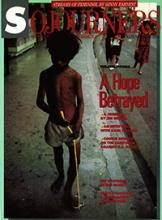Perhaps the last thing anyone would have expected to happen during the Reagan era was a renewal of interest in the idea of legalizing drugs. But there it is, right on the cover of the major news magazines and spattered throughout the discourse of political talk shows.
The legalization talk is not just about going easy on the kid with a half-ounce of marijuana. They ("they" being the usual assortment of pundits, pols, and experts) are talking about legalizing the whole dizzying, tranquilizing, and stimulating laundry list of contraband psychotropes--cocaine, heroin, maybe even PCP.
In marked contrast to the "legalize pot" days, none of the current legalization advocates actually condone the use of drugs, and especially not the aforementioned "hard" ones. Instead they are making the case that criminalization is doing nothing to curb drug use, abuse, and addiction. In fact, they say, criminalization of drugs is only serving to create a whole new set of costly, and often deadly, problems in the area of violent crime.
The argument goes something like this. Illegal drugs are very expensive and thus wildly profitable. Unfathomable truck-loads of drug-induced cash change hands daily, especially in the cocaine business. Drugs are so expensive, and thus so tantalizingly profitable, precisely because they are illegal.
Being banned by law makes cocaine a relatively scarce commodity. Large cash incentives are required to induce people to risk the long prison terms that can come with drug trafficking. Consequently, by the time the stuff reaches some poor sucker on the streets of my hometown, or yours, it's so expensive that the only way they can pay for it is by breaking a window and stealing your VCR, or my stereo.
Read the Full Article

